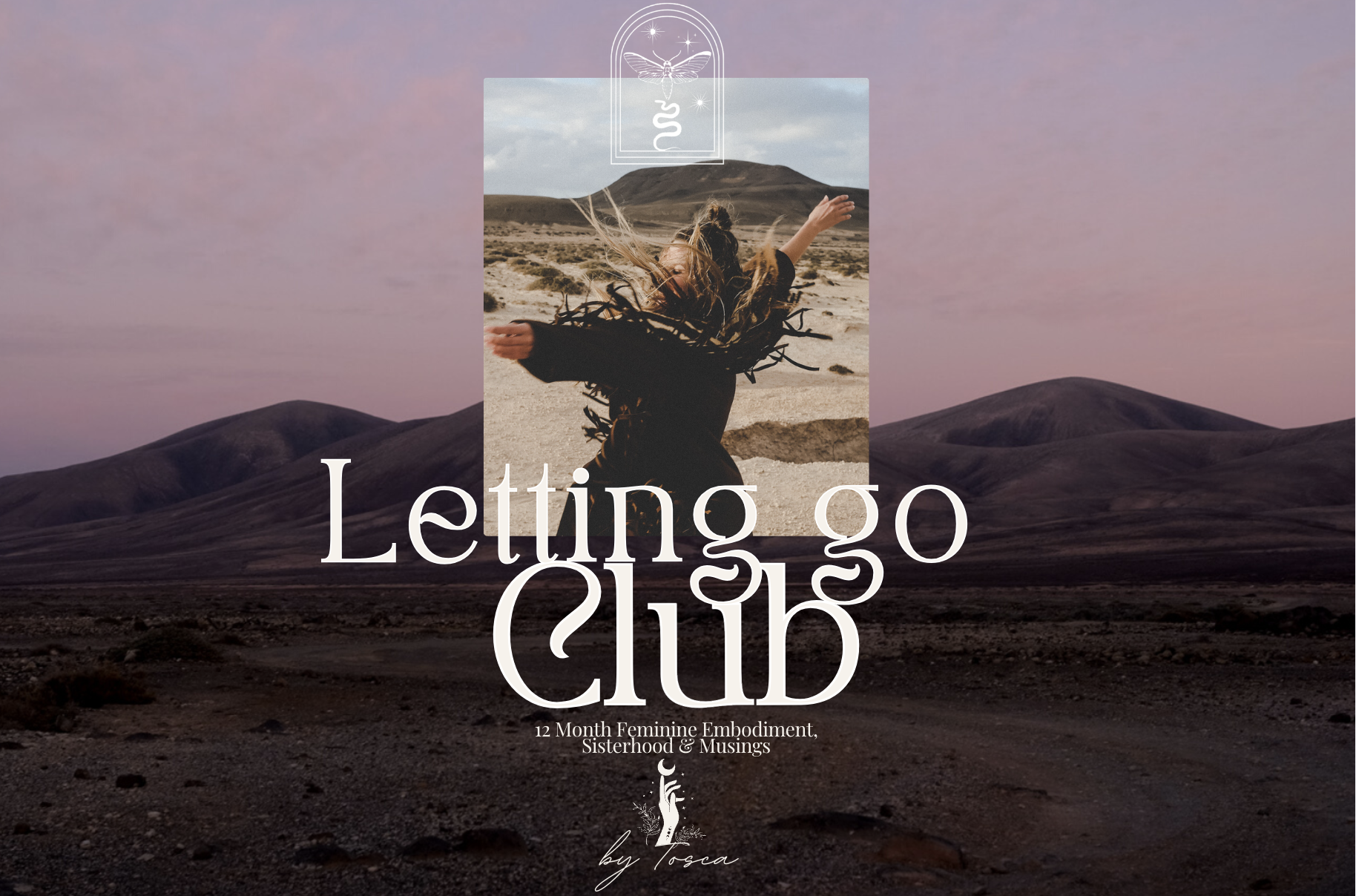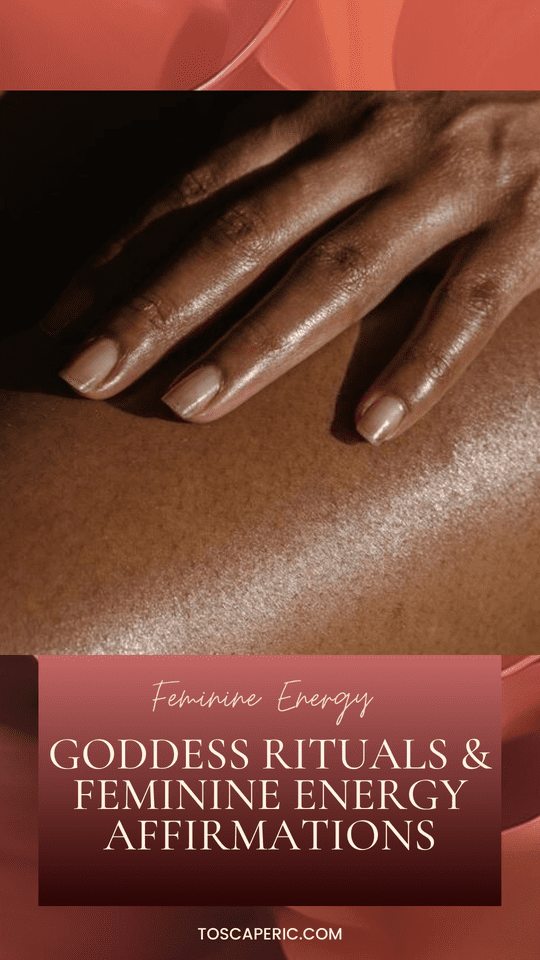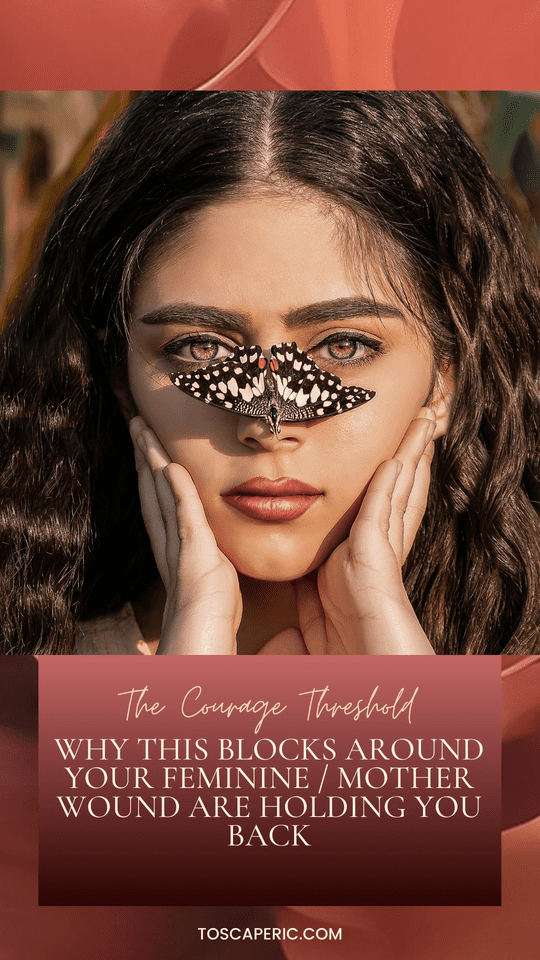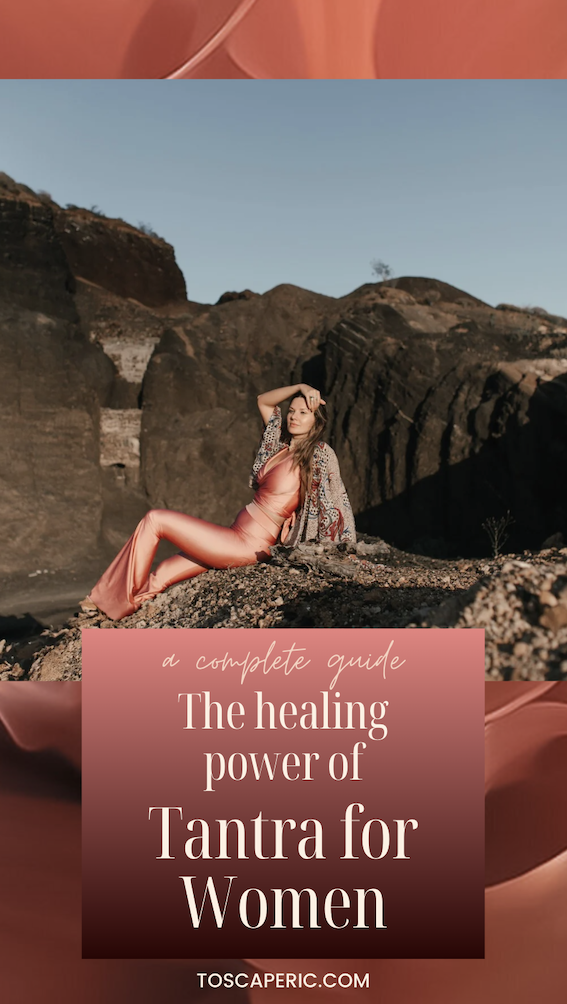I am Tosca
Welcome Goddess!
Are you healing one or more mother wounds? Me too. The mother-child relationship is one of the most formative connections in life. The dynamics of the mother wound can have profound and long-lasting effects that ripple through an individual’s adult life, particularly if the wounds are not acknowledged, healed, and transformed. These unresolved wounds can manifest in many areas of life, influencing how we relate to ourselves, our relationships, our careers, and our ability to experience joy, fulfillment, and emotional well-being. If left unaddressed, the mother wound can continue to shape the patterns of behavior, thought, and emotional responses that were learned in childhood.
1. Impact on Self-Worth and Identity
One of the most significant ways the mother wound affects adults is through the development of poor self-worth or a distorted sense of identity. A mother who was emotionally unavailable, overly critical, neglectful, or even overbearing may unintentionally teach her child that they are not worthy of love, attention, or success. As adults, this belief can persist and show up as low self-esteem, insecurity, self-doubt, or difficulty accepting love and affection from others.
Example: An individual who did not receive emotional validation from their mother may struggle with accepting praise at work or feel undeserving of compliments from others.
Effect: Constantly feeling unworthy, and striving to prove oneself to others or seeking external validation to fill the void left by a lack of maternal affection.
2. Difficulty with Boundaries and Relationships
Mother wounds often influence how individuals navigate relationships and set boundaries. If a person grew up with a mother who was enmeshed (over-involved), neglectful (emotionally distant), or controlling, they might struggle with establishing healthy boundaries in adulthood. They may either become overly dependent on others for emotional support or, conversely, be afraid to get close to anyone, fearing vulnerability or rejection. The experience of not having boundaries respected by the mother can lead to difficulty asserting needs or feeling entitled to space and autonomy.
Example: A person raised by a controlling or overbearing mother might feel suffocated in romantic relationships or, alternatively, could push others away out of fear of becoming too dependent.
Effect: Struggles with codependency, people-pleasing, fear of intimacy, or difficulty trusting others.
3. Repeating Unhealthy Patterns with Others
Without healing the mother wound, there is a risk of unconsciously repeating unhealthy relational patterns in adulthood. Individuals may find themselves drawn to relationships that mirror the dynamics they experienced with their mother. For example, someone with an emotionally unavailable mother may unconsciously seek out partners who are similarly distant, perpetuating feelings of abandonment and inadequacy.
Example: A person who had a critical or neglectful mother may partner with someone who is emotionally unavailable or dismissive of their needs, thereby recreating the emotional pain from childhood.
Effect: A cycle of unfulfilling, emotionally unbalanced relationships that feel familiar but never heal the root cause of the pain.
4. Impaired Emotional Expression and Vulnerability
A mother who invalidated her child’s emotions, ignored their feelings, or was overly critical can cause emotional repression in the child. As an adult, the person may find it difficult to express emotions, feel ashamed of their feelings, or believe that their emotions aren’t important. This emotional disconnection can lead to issues such as emotional numbness, anxiety, or difficulty forming deep emotional connections with others.
Example: A child who was dismissed for feeling sad or anxious may grow into an adult who suppresses emotions, avoiding vulnerability and intimacy for fear of rejection.
Effect: Emotional repression, difficulty understanding or processing emotions, and challenges in expressing oneself authentically.
5. Fear of Success and Achievement
The mother wound can also impact one’s ability to pursue and achieve personal goals. A mother who was critical or dismissive of her child’s talents or accomplishments may unintentionally instill a belief that success is unattainable, unworthy, or that achievement must be earned through perfectionism or constant proving. As a result, an adult may struggle with feelings of imposter syndrome or self-sabotage, especially when they are on the brink of success.
Example: An individual who had a mother who never celebrated their successes may downplay their achievements as an adult, even though they are highly capable.
Effect: Fear of success, self-sabotage, imposter syndrome, and an inability to recognize or enjoy achievements.
Join The Letting Go Club
12 Month Journey of Feminine Embodiment, Self-love, Sisterhood, Letting Go & Musings
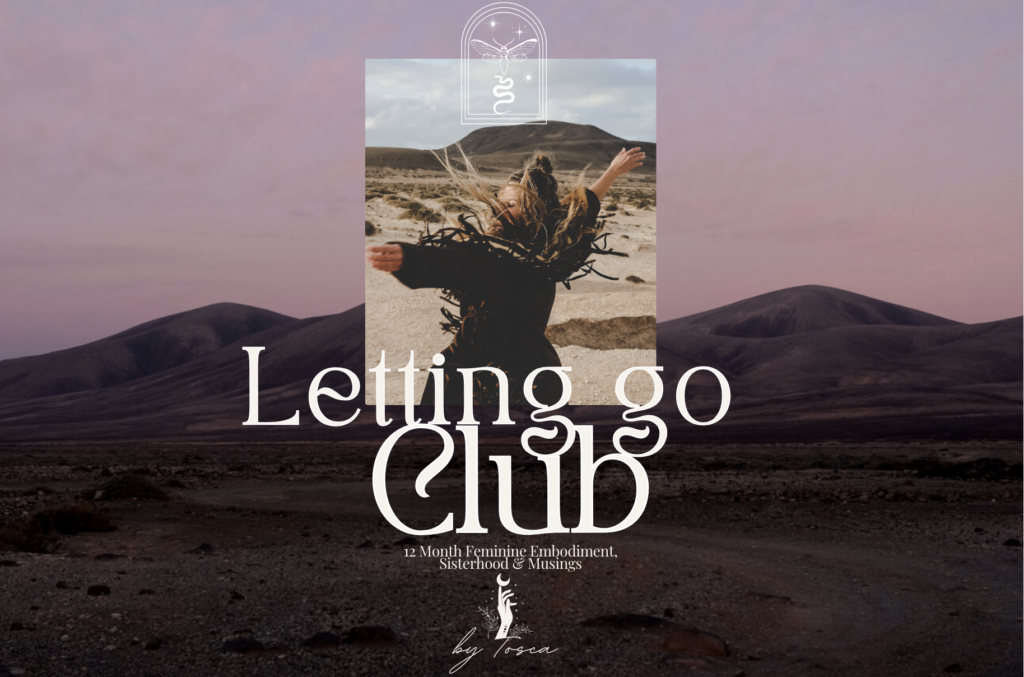
Reclaim your energy. Reclaim your power. Embrace your feminine flow. Sign up here.
6. Parenting from a Place of Trauma
For individuals with unresolved mother wounds, becoming a parent themselves can be both healing and challenging. Often, people may find themselves repeating the same patterns of behavior that they learned from their own mothers, even if they are unaware of it. Whether this manifests in overprotectiveness, emotional distance, or criticism, it can create cycles of trauma for the next generation. The person may also struggle to provide the emotional support, nurturing, or presence that they themselves needed as children.
Example: A person who was raised by an emotionally unavailable mother may unknowingly repeat this pattern, becoming emotionally distant or neglectful toward their own children.
Effect: Struggling with how to nurture and emotionally connect with children, perpetuating the same wounds in the next generation.
7. Struggles with Self-Care and Nurturing
The mother wound can also lead to difficulties in practicing self-care or self-nurturing. If a person did not receive the care and attention they needed from their mother, they may grow into an adult who has a hard time nurturing themselves. This could manifest as neglecting one’s physical, emotional, or mental health, as the individual may subconsciously believe they are undeserving of self-care or not know how to care for themselves properly.
- Example: Someone raised in an environment where self-care was not modeled may neglect their own health, avoid seeking help when needed, or feel guilty when taking time for themselves.
- Effect: Burnout, chronic stress, anxiety, or physical health problems due to neglecting self-care.
8. Perfectionism and People-Pleasing
A mother who was excessively demanding, critical, or had unrealistic expectations may cause a child to internalize the belief that they must be perfect to gain love or acceptance. This can lead to perfectionism or people-pleasing behaviors in adulthood, where an individual is always striving to meet others’ expectations and fears failure or rejection.
Example: An adult who was always told by their mother that nothing was ever good enough may become a perfectionist who constantly strives for flawlessness in their personal and professional life, fearing criticism or judgment.
Effect: Anxiety, chronic stress, burnout, a fear of failure, and difficulty accepting imperfections.
Join The Letting Go Club
12 Month Journey of Feminine Embodiment, Self-love, Sisterhood, Letting Go & Musings

Reclaim your energy. Reclaim your power. Embrace your feminine flow. Sign up here.
It sets the foundation for how individuals perceive themselves, form relationships, and navigate the world. When a mother wound exists, it often involves complex and deeply ingrained power dynamics that shape this bond. Understanding these dynamics is essential for recognizing how they influence our behaviors, beliefs, and emotional well-being.
The Unequal Balance of Power
From birth, a child depends entirely on their mother (or primary caregiver) for survival, love, and nurturing. This creates an inherent imbalance of power, as the mother holds the key to meeting the child’s basic physical and emotional needs. When a mother provides unconditional love, guidance, and validation, this dynamic is healthy and fosters growth. However, in the presence of a mother wound, the unequal balance of power may be misused, distorted, or unintentionally harmful.
- Dependency and Vulnerability
- In childhood, a child has no choice but to rely on their mother, even if the care they receive is inconsistent, neglectful, or abusive. This dependency can create a sense of helplessness when the mother is unable—or unwilling—to meet the child’s needs.
- The child often learns to adapt to the mother’s emotional availability, walking on eggshells to avoid rejection or conflict, further reinforcing the mother’s power in the relationship.
- Control and Emotional Manipulation
- Some mothers exert power through emotional manipulation, such as guilt, shame, or conditional love. For example, a mother might withhold affection unless the child behaves in a way that pleases her or meets her needs.
- This dynamic teaches the child that love and approval must be earned, which can lead to people-pleasing tendencies and difficulty setting boundaries in adulthood.
When Roles Are Reversed: Parentification
In some cases, the power dynamic flips, and the child is forced to assume the role of the caregiver. This is known as parentification, where the mother relies on the child for emotional or practical support instead of fulfilling her parental duties.
Emotional Parentification: The child becomes a confidant or emotional caretaker for the mother, absorbing her stress, fears, or frustrations.
Practical Parentification: The child takes on responsibilities beyond their years, such as caring for siblings, managing household tasks, or acting as a mediator in family conflicts.
These dynamics rob the child of their childhood, forcing them to grow up too quickly and suppress their own needs to maintain the family’s stability.

If you’re enjoying this, subscribe to my self-love letters for free.
Cultural and Generational Influences
Power dynamics within the mother wound are often reinforced by cultural and generational factors.
- Patriarchy and Maternal Sacrifice
- In many cultures, women are expected to prioritize their children and families over themselves. Mothers who feel disempowered by societal expectations may unconsciously project their frustrations onto their children.
- These dynamics can create a cycle of unmet needs, where the mother’s pain is passed down to the next generation.
- Generational Trauma
- Mothers who have experienced trauma, neglect, or abuse in their own childhoods may perpetuate similar patterns in their relationships with their children.
- This intergenerational transmission of pain is not always intentional but reflects the unresolved wounds of previous generations.
The Child’s Response to Power Dynamics
Children respond to the power dynamics of the mother wound in various ways, depending on their temperament and circumstances. Common responses include:
- Compliance
- Some children become overly compliant, striving to meet their mother’s expectations in an attempt to gain her approval or avoid conflict.
- This often leads to suppressed emotions, a loss of identity, and difficulty asserting themselves in adulthood.
- Rebellion
- Other children may rebel against the mother’s authority, resisting her control as a way to reclaim their autonomy.
- While rebellion can be a form of self-preservation, it can also lead to strained relationships and an inability to trust authority figures later in life.
- Withdrawal
- Some children emotionally withdraw from their mother, creating distance to protect themselves from harm.
- This disconnection can result in feelings of isolation, difficulty forming attachments, and a lack of emotional intimacy in relationships.
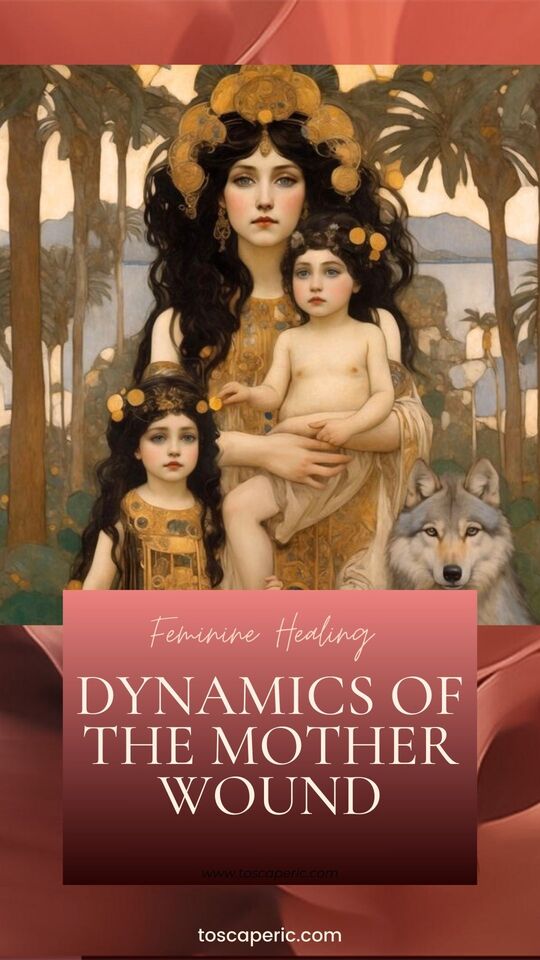
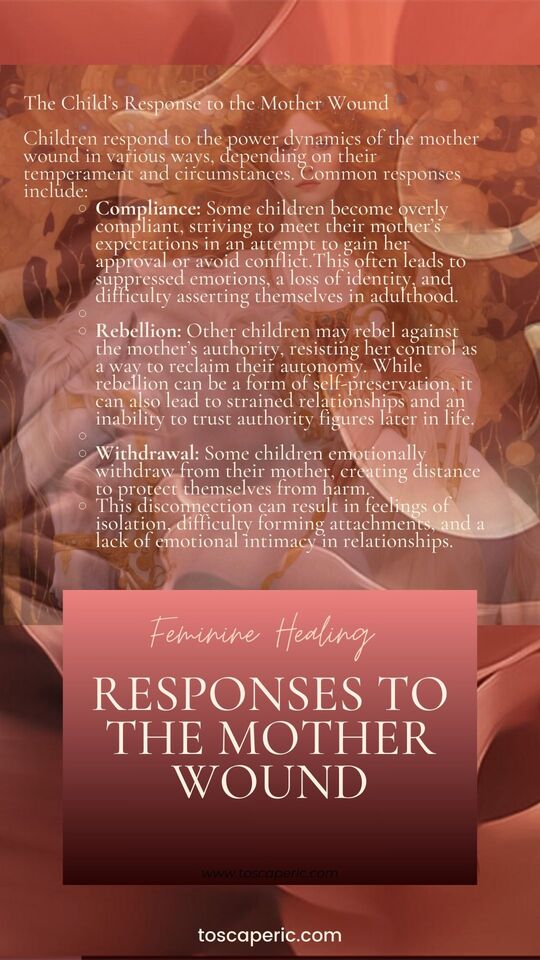
Breaking Free from the Dynamics of the Mother Wound
Healing from the power dynamics of the mother wound requires acknowledging their impact and taking steps to reclaim your autonomy.
- Recognize the Patterns
- Reflect on how the power dynamics with your mother have influenced your behaviors, beliefs, and relationships.
- Journaling or working with a therapist can help you identify patterns and triggers.
- Reclaim Your Power
- Set boundaries that honor your needs and protect your emotional well-being, even if it means redefining your relationship with your mother.
- Challenge limiting beliefs instilled by the mother wound, such as feeling unworthy of love or fearing rejection.
- Forgive Without Excusing
- Forgiveness is a personal choice that can help you release the emotional weight of resentment. However, it doesn’t mean excusing harmful behavior or ignoring its impact.
- Forgive to free yourself, not to reconcile unless you feel it’s truly safe and beneficial.
- Create New Dynamics
- Focus on building relationships that are balanced, reciprocal, and nurturing.
- Choose to surround yourself with people who respect your boundaries and affirm your worth.
Conclusion: The Cost of Unhealed Dynamics of the Mother Wound
If the mother wound is not addressed and healed, it can continue to affect various aspects of life in ways that can limit personal growth, happiness, and emotional fulfillment. Healing the mother wound involves reclaiming one’s sense of self-worth, learning how to establish healthy boundaries, fostering self-compassion, and transforming deeply ingrained patterns.
By acknowledging and working through these wounds, individuals can break free from the limitations of the past, step into their authentic power, and create healthier, more fulfilling relationships with themselves and others. Healing is not just for the individual—it also has the potential to create a ripple effect that benefits future generations, as people learn to parent and interact from a place of greater emotional awareness and wisdom.
The Path to Empowerment and Healing of the Dynamics of the Mother Wound
Breaking free from the power dynamics of the mother wound is a courageous act of self-liberation. It involves recognizing the ways in which these dynamics have shaped your life and choosing to redefine them on your terms. By stepping into your own power, you can create a future where your relationships are built on mutual respect and love, free from the shadows of the past.
Through this process, you not only heal yourself but also break the cycle for future generations, transforming the pain of the mother wound into a legacy of resilience, self-love, and empowerment.
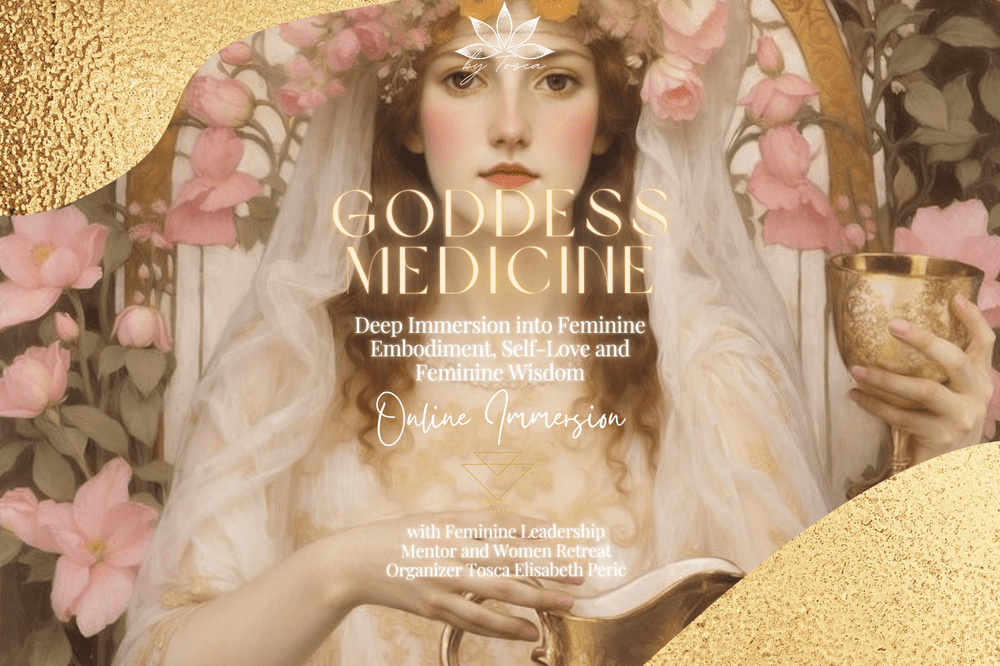
Family dynamics often shape two types of children: those who unconsciously repeat the cycles of pain, dysfunction, and unresolved trauma, and those who courageously choose to break free and heal.
Repeating the cycle often stems from a lack of awareness or the belief that things cannot change, while breaking free from generational trauma and the cycle requires bravery, introspection, and intentional effort. You have the power to decide which path you’ll take.
Do you want to address your mother wound, transform your pain into empowerment, and step into your most authentic self? Join my course or sign up for Goddess Medicine today and start your journey toward healing and freedom. Your future self is waiting.
Keep reading about the Mother Wound:
How The Mother Wounds Affect Us
Finding Forgiveness for the Mother Wound
